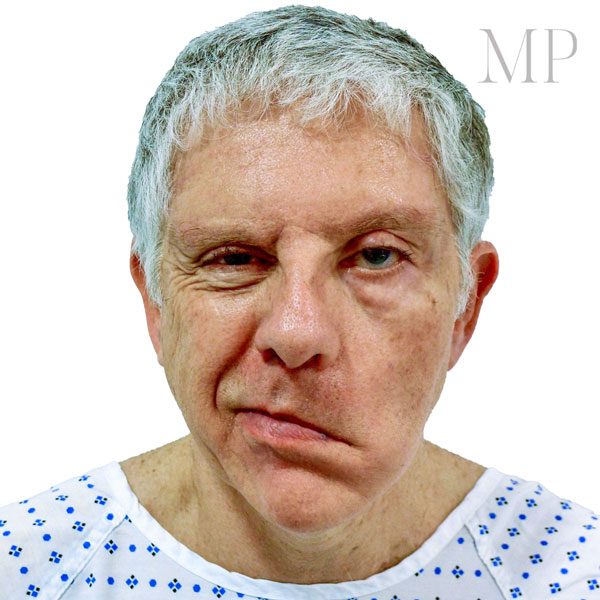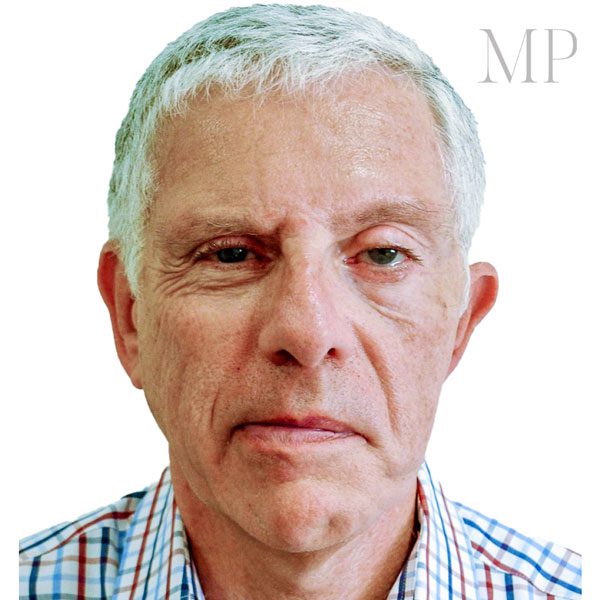Tumours Involving The Facial Nerve
In removing tumours which encase or involve the facial nerve, we typically have to sacrifice the nerve. This generally renders the patient with an inanimate or paralysed face on one side, of which if we do nothing can lead to obvious facial deformity. The affected side doesn’t smile but also has functional concerns with oral drooling and a potential red eye.
Mr Potter has several techniques available which he can use to minimise the effects of the facial palsy from static slings to reanimation techniques to restore the smile to aim for an appearance that is as near as possible to the face before the facial nerve lost its function.
Where possible Mr Potter will use a free flap, which is the “transplantation” of tissue from one part of the body to another with its own blood supply. Following this, Mr Potter needs to plumb this blood supply (anastomosed) into arteries and veins at the site of the cancer defect. For this purpose, and in this instance Mr Potter takes tissue from the leg and moves this to the head.
Subsequently this tissue provides the bulk necessary to minimise the cosmetic deformity often caused by having a tumour removed. Mr Potter then “rewires” the face so that within 3 months (on average) the face on the affected side learns to re-smile using nerves that are often used to clench one’s teeth.
At the time of the operation Mr Potter also rewires the face connecting the two ends of the facial nerve together using a nerve with its own blood supply taken with the leg tissue. Significantly, Mr Potter has shown smiling on the affected side returns at 3 months. This initial smile markedly improves over a period of 12-18 months maturing and looking more natural. In conclusion, this reanimation has been found to work in 100% of all cases, independent of age, with the oldest patient in Mr Potter’s series being 82 years old.
Mr Potter works hand in hand with a team of facial therapists and ancillary staff who review and monitor the progress of such reanimation techniques to optimise and maintain the outcome (ref YouTube videos).
Mr Potter’s series of such cases was presented at the British Skull base society meeting, Liverpool (January 2018). It is the largest series of facial reanimation using such a “rewiring” technique. Of those that we follow up with for greater than 9 months, all have functioning facial muscles on the affected side.
If you are have an interest in discussing potential treatment with Matthew Potter please contact us here.

Number of skull/bases cases undertaken
144
Return to theatre rate for lateral skull base cases
3%
Average number of days in hospital
10 days
Of those with reanimation procedures to the face the average time for facial nerve function to return
14 weeks
Percentage return of facial movement at three months following facial reanimation
66%
Percentage number of patients with return of facial movement at 6 months
100%
Percentage loss of flaps for skull base reconstruction 1/144 = 0.7 %
total flap loss = 0% partial loss = 0.7%
Percentage loss of free flaps used for skull base reconstruction
0%
Return to theatre rate for lateral skull base reconstruction
1%
30 day post operative mortality rate for skull base cases
0%
3 month post operative mortality for skull base cases
0%
Average age of patient
68
Patient age range
27- 89 years

